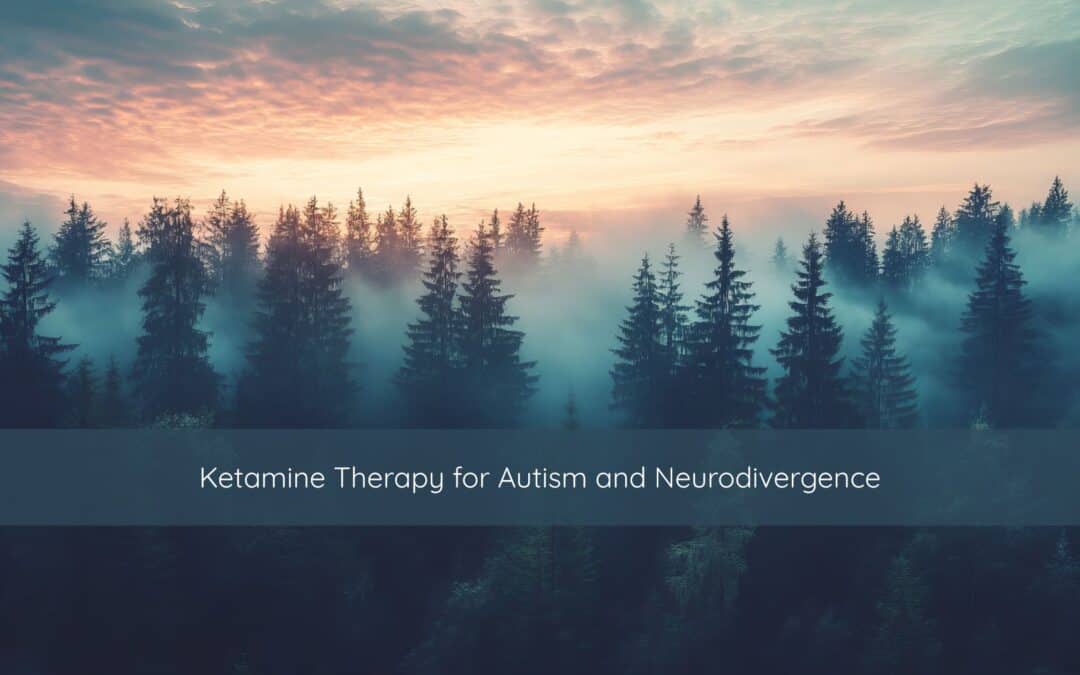 Living in a world designed for neurotypical minds can be deeply challenging for autistic and neurodivergent individuals. Many people on the spectrum experience chronic stress, exhaustion, and emotional pain from trying to fit in, often without the understanding or support they need.
Living in a world designed for neurotypical minds can be deeply challenging for autistic and neurodivergent individuals. Many people on the spectrum experience chronic stress, exhaustion, and emotional pain from trying to fit in, often without the understanding or support they need.
Although research on Ketamine-Assisted Psychotherapy (KAP) for autism is still emerging, our Ketamine Therapy team at The Catalyst Center has witnessed promising benefits for neurodivergent clients who explore ketamine therapy as part of their healing journey.
While autism is a natural form of neurodiversity rooted in brain biology, many autistic and neurodivergent individuals also experience emotional challenges such as anxiety, depression, and trauma—often as a result of living in a world not designed for their nervous systems. These are areas where KAP has a strong evidence base for offering meaningful support.
Let’s explore how KAP can help neurodivergent clients find greater calm, flexibility, and self-compassion.
Understanding Autistic Burnout
For many autistic and neurodivergent individuals, daily life can feel like a constant performance. Continually adapting to social expectations, managing sensory overload, and masking traits to avoid misunderstanding can take an enormous toll. This experience is known as autistic burnout—a state of deep fatigue, overwhelm, and emotional depletion.
Over time, this chronic stress can dysregulate the nervous system, leaving someone stuck in “fight or flight” mode and unable to truly rest.
As the nervous system becomes increasingly strained and exhausted, opportunities for deep rest or regulation can feel out of reach. This is where ketamine can be profoundly supportive. Many clients describe feeling their body finally relax and release long-held tension—a sense of relief and safety that may be unfamiliar but deeply comforting.
By creating this sense of deep safety and relief, ketamine helps reset the nervous system, teaching or reminding the body what relaxation feels like. When paired with psychotherapy, this state of calm can become fertile ground for healing. Clients often become more receptive to insight and can more easily integrate tools for grounding, self-soothing, and self-acceptance, carrying these skills into daily life.
Supporting Mental Flexibility and Reducing Obsessive Thinking
How Ketamine-Assisted Therapy Supports Flexibility and Eases Rigid Thought Patterns
 Many autistic people experience intense focus, repetitive thought loops, or rigid thinking patterns that can be distressing. Ketamine can be uniquely effective in interrupting these hardwired neural cycles, creating space for new, more adaptive ways of thinking to emerge.
Many autistic people experience intense focus, repetitive thought loops, or rigid thinking patterns that can be distressing. Ketamine can be uniquely effective in interrupting these hardwired neural cycles, creating space for new, more adaptive ways of thinking to emerge.
, During a ketamine session, the mind slows down, and thoughts feel less urgent. This calm mental space allows for deeper self-reflection and emotional regulation. Fear, shame, and anxiety often ease, making it possible to view one’s thoughts and behaviors from a broader, more compassionate perspective. In addition, emerging research suggests ketamine can temporarily reduce activity and connectivity within the brain’s default mode network (DMN)—a system involved in self-referential thinking and rumination—further decreasing the “mental background noise” that keeps rigid loops in place.
Think of it like zooming out from the dense trees of a forest to see the full landscape. In Buddhist language, this might be described as a release from “ordinary mind.” While that may sound daunting, ketamine’s gentle, soothing effects help individuals feel safe as they loosen their attachment to repetitive or distressing thought patterns.
Through integration work following KAP sessions, these new insights can solidify. Clients begin embodying a more flexible, spacious mindset, bringing greater ease and acceptance into everyday life.
Supporting Depression, Anxiety, and Trauma in Autistic and Neurodivergent Individuals
The goal of Ketamine Therapy for autism and neurodivergence is not to “fix” or “cure” anyone—it’s to support each person’s ability to feel safe and grounded, able to navigate the world with greater ease and authenticity.
While ketamine doesn’t directly change neurotype, it has extensive evidence for helping with depression, anxiety, and trauma—common experiences for people navigating a world that often misunderstands or invalidates their differences.
Repeated experiences of social exclusion, sensory overwhelm, or stigma can create deep emotional wounds. These experiences often lead to chronic self-doubt, shame, and loneliness. Left unaddressed, they can evolve into depression or anxiety.
Ketamine offers a pathway toward healing by softening the emotional defenses that can form in response to chronic stress. During the ketamine trance state, activity in the default mode network (DMN)—the part of the brain that reinforces repetitive, shame-based thought loops—temporarily quiets. This pause creates a window where clients can access emotions that are typically defended against in ordinary consciousness.
In this space, with the supportive presence of a trained psychotherapist, clients often experience new perspectives of compassion, self-acceptance, and connection. Over time, this process helps retrain the brain’s emotional patterns, reducing rigidity and opening pathways to healing.
Through repeated KAP sessions, clients learn to release old narratives rooted in shame or inadequacy and begin cultivating self-understanding, gentleness, and confidence.
Moving Toward Wholeness
At The Catalyst Center, we see Ketamine Assisted Therapy as a way to help neurodivergent clients rediscover calm, curiosity, and connection—not by changing who they are, but by helping them access their natural state of balance and resilience.
KAP can soften the edges of living in a neurotypical world, offering moments of peace and insight that ripple outward into daily life. When individuals on the spectrum feel safe to be themselves—without judgment, expectation, or masking—they often find a deeper sense of belonging, both within and beyond the therapy room.
Interested in Learning more about Ketamine for Autism?
If you or someone you care about is curious about exploring Ketamine Therapy for autism or neurodivergence, our compassionate clinicians are here to help. Learn more about our KAP program or reach out today to begin your healing journey.
Call schedule a free introductory call or contact us.

